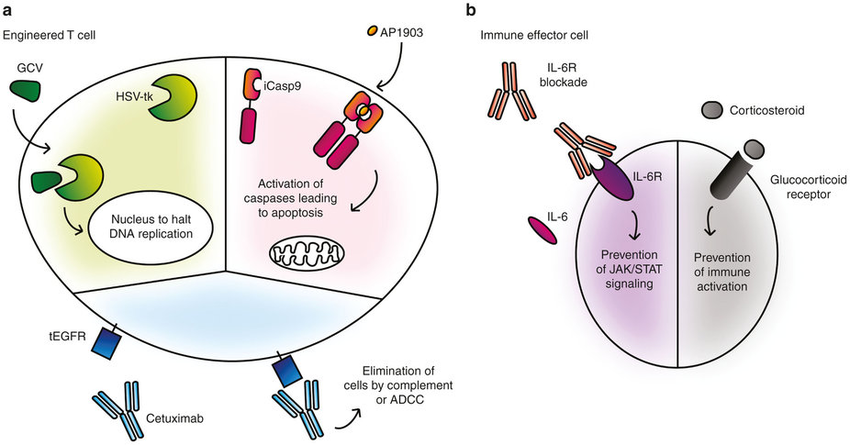Programming CAR Technologies
T cells can express tumor-antigen by CAR design construction construction, which can lead to a high rate of complete
response in
patients with hematologic malignancies. Despite its early success, CAR-T cells still face challenges associated with
treatment-related toxicity and tumor antigen negative recurrence due to their wide applications in cancer treatment
to a larget extent. Creative Biolabs has overcome these difficulties by programming gene modules and improved the
therapeutic efficacy and specificity of T cells.
Programming CAR Technologies Service Overview
Program CAR design to meet the needs of most customers, with high specificity, it can be easily produced in
a mature way against most antigens and can be grafted into a car design easily by our experienced scientific
team.
Suicide CAR Platform
It is a strategy to control the severe toxicity of CAR-T cells by rapidly ablating the transplanted cells
with a suicide switch.
-
Herpes simplex virus thymidine kinase (HSV-TK)
-
Human caspase 9 (iCasp9)
-
CD20 suicide gene
-
Ganciclovir and clear CAR-T cells
-
FK506 binding protein (FK506BP), AP1903 and clear CAR-T cells
-
Rituximab and clear CAR-T cells
 Fig.1 Management of
chimeric antigen receptor (CAR) T-cell toxicity
Fig.1 Management of
chimeric antigen receptor (CAR) T-cell toxicity
Inducible CAR Platform
-
Dimerizing drug to induce CAR for CAR assembly, to mitigate these effects and increase specificity.
-
Abe to direct CAR cells to TAA by adding Fab labeled with PNE.
-
Provide expression systems to turn on the expression of CAR.
Bispecific CAR Platform
Easily provide bispecific CAR to alleviate this escape mechanism by targeting both antigens simultaneously.
Masked CAR Platform
Through blocking scFv and controlling T cell status, they can be promoted to reach the tumor microenvironment easily.
Oxygen-sensing CAR Platform
Control normoxia or hypoxic conditions to regulate CAR degradation or stable expression.
Highlights
Programming CAR-T design improves cell persistence and overcomes immunosuppression, emphasizing the control of CAR-T specificity and activity.
-
Possess worldwide senior scientific research talents to programme CAR design for your projects in cell and gene
therapy industry.
-
Mature cell production and translational medicine research platforms enable your experiments to be completed
efficiently and smoothly.
-
Extensive experience in scientific research management, a reasonable division of labor, and effective teamwork
to ensure the whole production process move favorably as planned.
Free to contact us and we will get back to
you as soon as possible.
Reference
-
Bonifant, Challice L., et al. "Toxicity and management in CAR T-cell therapy." Molecular Therapy-Oncolytics 3 (2016).
For Research Use Only | Not For Clinical Use


 Fig.1 Management of
chimeric antigen receptor (CAR) T-cell toxicity
Fig.1 Management of
chimeric antigen receptor (CAR) T-cell toxicity
 Download our brochure
Download our brochure